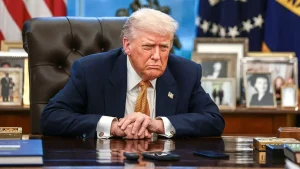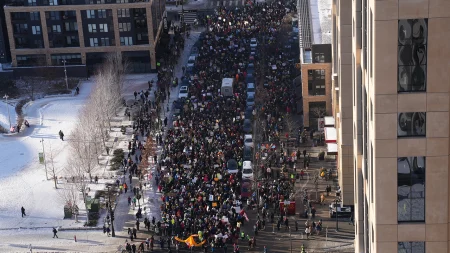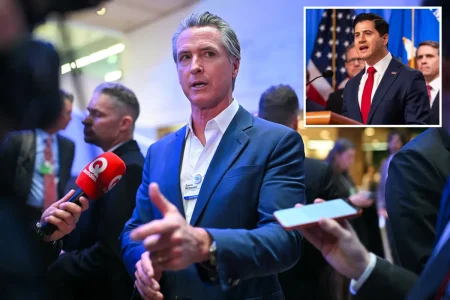Venezuelan Opposition Leader María Corina Machado Awarded Nobel Peace Prize for Democratic Advocacy
Champion of Democracy Receives Global Recognition Amid Political Persecution
In a decision that sends a powerful message about the global importance of democratic rights, the Norwegian Nobel Committee has awarded the Nobel Peace Prize to Venezuelan opposition leader María Corina Machado, citing her “tireless work promoting democratic rights” in a country experiencing one of the Western Hemisphere’s most severe political and humanitarian crises. The announcement comes as Machado, who successfully built one of Venezuela’s most significant political movements in recent history, continues to live in hiding, having fled government persecution following last year’s disputed presidential election.
The award represents a remarkable validation for Machado, who has spent decades advocating for democratic principles in Venezuela despite facing escalating threats, legal persecution, and attempts to silence her voice. “This recognition belongs not to me alone, but to every Venezuelan who continues to dream of a free and democratic nation,” Machado said in a statement released through secure channels from an undisclosed location. Her journey from opposition parliamentarian to the leader of a nationwide movement challenging President Nicolás Maduro’s increasingly authoritarian rule reflects the complex struggle for democracy in a country where political dissent has become increasingly dangerous.
A Political Career Forged in Resistance
María Corina Machado’s path to international recognition began long before she became Venezuela’s most prominent opposition figure. Born to a middle-class family in Caracas in 1967, Machado initially pursued a career in industrial engineering before founding civil society organizations focused on electoral transparency and democratic governance during Venezuela’s turbulent early 2000s. Her entrance into formal politics came in 2010, when she won election to Venezuela’s National Assembly as an independent, quickly establishing herself as a principled critic of then-President Hugo Chávez’s consolidation of power.
What distinguishes Machado from many of her contemporary opposition colleagues has been her unwavering stance against compromising with a government she views as fundamentally antidemocratic. “When basic democratic principles are violated, dialogue becomes a tool of subjugation, not reconciliation,” Machado famously declared during a 2019 rally that drew hundreds of thousands of supporters to Caracas. This uncompromising position has earned her criticism from pragmatists within opposition circles who have advocated for negotiated solutions, but it has also cemented her reputation among supporters as Venezuela’s most authentic democratic voice. Political analyst Fernando Martínez of the Universidad Central de Venezuela notes that “Machado’s consistency has been her greatest political asset in a landscape where many opposition leaders have been compromised or co-opted.”
Building a Movement Under Duress
The Nobel Committee’s recognition highlights not only Machado’s personal courage but her exceptional organizational achievements under extraordinarily difficult circumstances. Beginning in 2021, Machado launched a grassroots movement called “Vente Venezuela” that methodically built political infrastructure across the country’s 23 states, focusing particularly on low-income neighborhoods that had historically supported the ruling socialist party. Working with limited resources and under constant surveillance, her team trained thousands of electoral witnesses, created secure communication networks, and developed sophisticated legal strategies to protect voters’ rights.
By early 2023, this organization had evolved into a formidable political force capable of mobilizing millions of Venezuelans despite governmental restrictions on public gatherings and access to traditional media. “What Machado accomplished represents a master class in political organization under authoritarian conditions,” explains Dr. Carmen Rodríguez, an expert in Latin American politics at Georgetown University. “Her team created parallel structures that could function even as conventional political activities were criminalized.” This organizational strength proved crucial during the 2023 presidential primary, where Machado won an overwhelming 83% of votes, establishing her as the clear standard-bearer for Venezuela’s democratic opposition despite the government’s subsequent ban prohibiting her from officially appearing on the 2024 presidential ballot.
Living in the Shadows While Leading a Movement
The Nobel Committee’s decision draws attention to Machado’s current precarious situation. Following the disputed July 2024 presidential election, in which Maduro claimed victory despite widespread evidence of fraud documented by international observers, Machado was forced into hiding as government forces began arresting key members of her campaign team. Operating from a series of safe houses and communicating through encrypted channels, she has continued coordinating opposition strategy while evading capture. “The fact that Venezuela’s most popular political figure must live as a fugitive in her own country speaks volumes about the democratic breakdown this award seeks to highlight,” noted Tamara Taraciuk of Human Rights Watch.
Machado’s clandestine existence has not diminished her political influence. If anything, it has elevated her status among Venezuelans increasingly disillusioned with international mediation efforts that have failed to restore democratic governance. Recent polling by the respected Datanálisis firm indicates that over 70% of Venezuelans view Machado as the country’s legitimate political leader, compared to just 15% who recognize Maduro’s claim to the presidency. From hiding, she has orchestrated sophisticated pressure campaigns combining street demonstrations, international advocacy, and strategic legal challenges that have kept Venezuela’s democratic crisis in the global spotlight despite growing authoritarian entrenchment.
International Implications and the Road Ahead
The Nobel Peace Prize confers more than symbolic recognition; it potentially reshapes international dynamics surrounding Venezuela’s political crisis. For years, various international actors have pursued differing approaches to addressing Venezuela’s democratic breakdown, with European nations generally favoring diplomatic pressure, the United States applying economic sanctions, and regional Latin American governments oscillating between engagement and isolation of the Maduro government. The Nobel Committee’s decision effectively endorses Machado’s contention that Venezuela’s situation represents not merely a political dispute but a fundamental struggle for democratic principles.
“This award creates a moment of clarity for the international community,” argues José Miguel Vivanco, former Americas director at Human Rights Watch. “It elevates Venezuela’s democratic crisis from a regional issue to a global human rights priority.” For Machado herself, the recognition provides both protection and a platform. While the prize’s visibility may make it more politically costly for the Venezuelan government to arrest her, it also creates new opportunities to advocate for concrete international actions supporting democratic restoration. As one of her advisors, speaking on condition of anonymity, explained: “The Nobel Prize transforms María Corina from a Venezuelan opposition leader into a global democratic symbol. This creates leverage that can be directed toward specific diplomatic, legal, and humanitarian objectives.”
A Testament to Democratic Resilience
The Norwegian Nobel Committee’s decision to honor Machado arrives at a critical juncture for democracy globally. With Freedom House documenting democratic backsliding in countries across multiple continents, Venezuela’s experience represents both a cautionary tale and a testament to democratic resilience under extreme pressure. Through Machado’s recognition, the committee not only validates her personal courage but affirms the fundamental importance of citizens’ rights to freely choose their representatives through fair electoral processes.
For millions of Venezuelans experiencing the harsh realities of economic collapse, humanitarian crisis, and political repression, Machado’s Nobel Prize offers a moment of vindication and hope. As the country approaches its third decade of authoritarian governance, the award serves as a reminder that the international community has not forgotten Venezuela’s democratic aspirations. Whether this recognition will translate into concrete progress toward restoring democratic governance remains uncertain, but in elevating Machado’s voice, the Nobel Committee has ensured that Venezuela’s struggle will continue to resonate far beyond its borders. “Democracy is not merely a system of government but a fundamental human right,” Machado wrote in her most recent public statement. “This prize belongs to every Venezuelan who refuses to surrender that right, no matter the cost.” In recognizing her work, the Nobel Committee has affirmed this principle at a time when democratic values face challenges worldwide.







